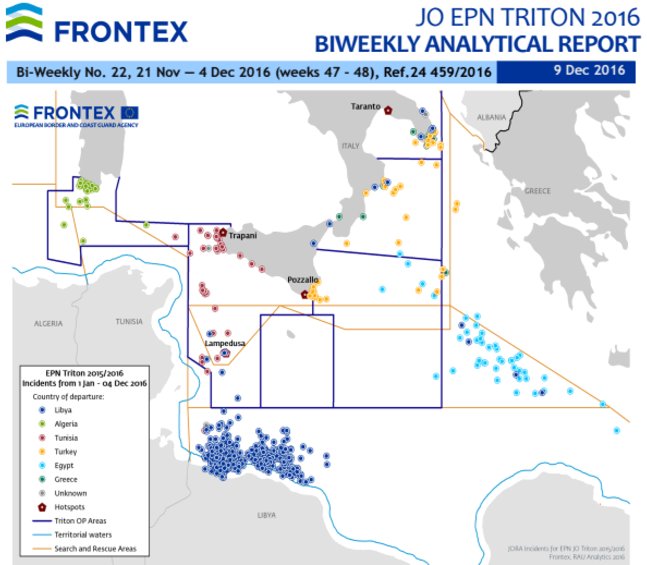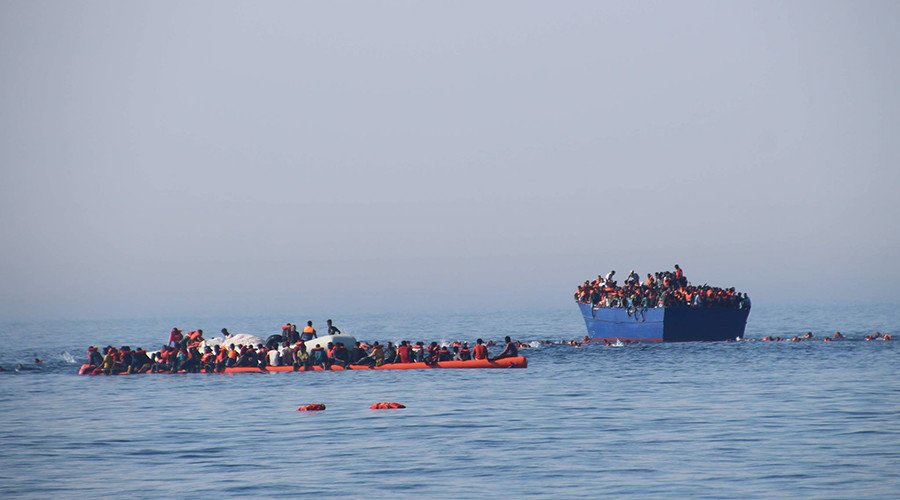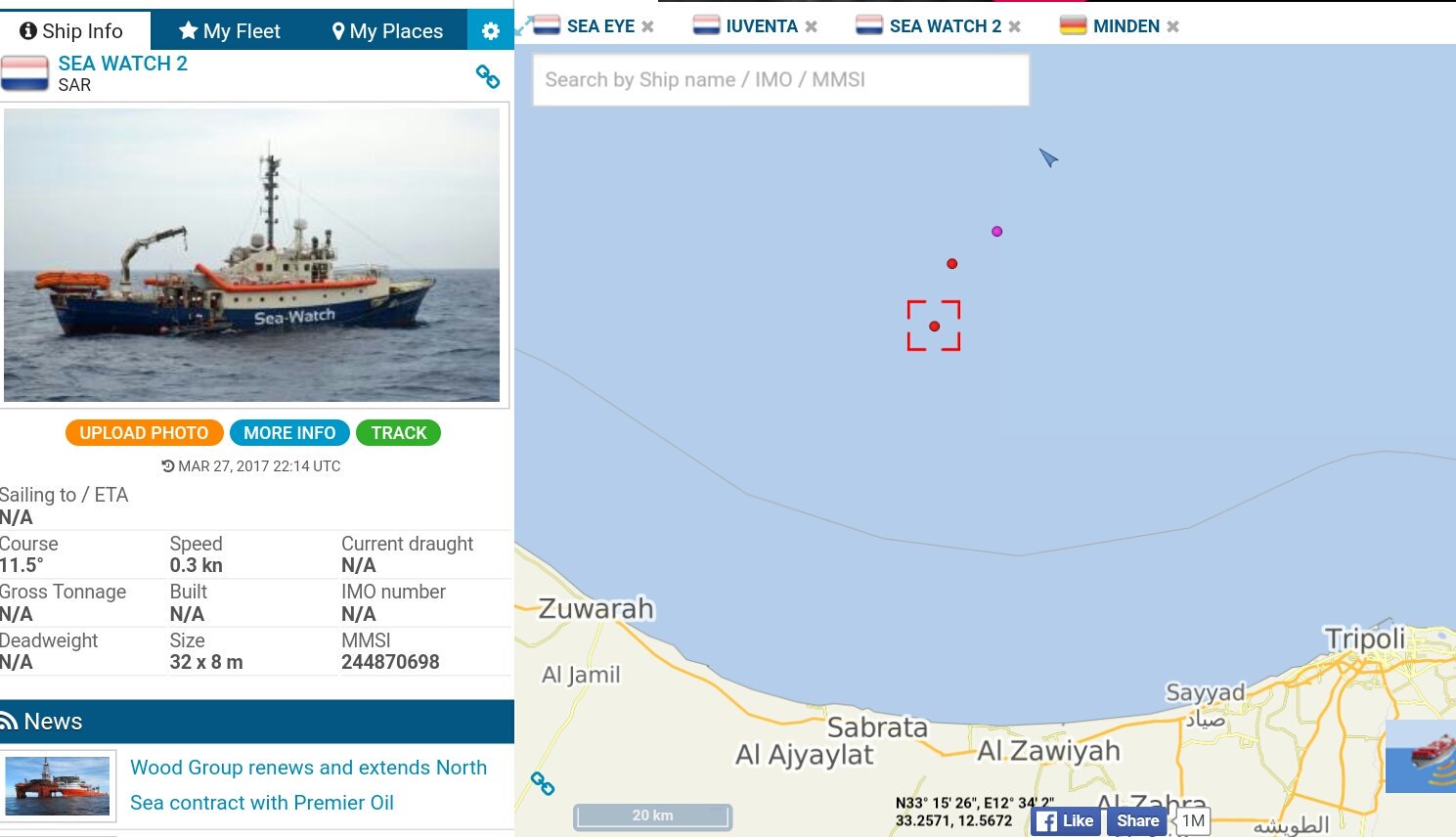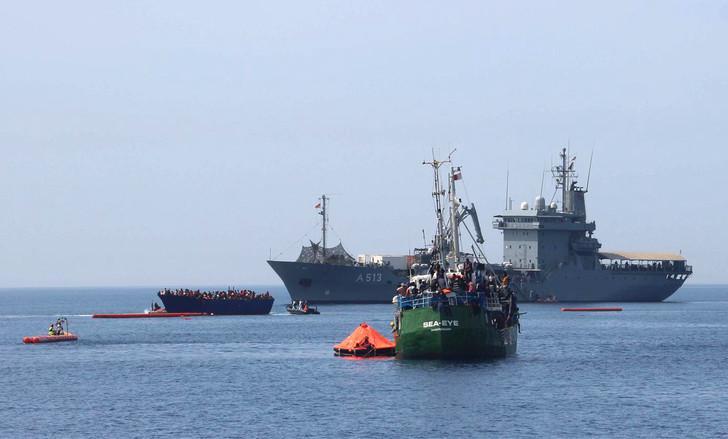From CNN by Barbie Latza Nadeau
Calm seas, desperate migrants and ruthless human traffickers all played a role in a record-breaking weekend of maritime rescues in the Mediterranean Sea between Italy and Libya.
But even as the rescue vessels race against time to save lives, another battle is brewing with accusations from the European Union's border control agency Frontex against nongovernmental organizations like Doctors Without Borders and the Mobile Offshore Aid Station, or MOAS, that run so-called charity rescue ships.
Frontex says the charity rescue vessels create a pull factor for migrants and traffickers; the NGOs say they are out there in the absence of an EU strategy to save lives at sea and a lack of initiative to provide a safe corridor option for migration and asylum.
Here is a map of Frontex’s patrol area compared to where the shipwrecks happen.
On Sunday evening in Italy, the Italian Coast Guard estimated the number of those rescued since Friday was approaching 7,000, though that number will surely grow as a steady stream of rubber dinghies and rickety wooden fishing vessels were still being spotted off the coast of Libya.
At least 20 cadavers, including that of an 8-year-old boy recovered during rescue operations, were also brought to Sicily and the Italian mainland with the survivors.
The migrants and refugees were rescued by Italian Coast Guard boats, passing merchant ships and more than a dozen NGO charity ships that have filled the vacuum created when Italy's Mare Nostrum search and rescue program ended in 2014 because of budget concerns.
The Mare Nostrum project cost Italian taxpayers €9 million ($9.5 million) a month, according to the Italian Navy.
The charity ships, which rely on donations, have estimated operating costs of around €11,000 ($11,666) a day, charities say.
Since the beginning of the year, 32,750 migrants and refugees have arrived on European shores, not including those rescued this weekend, according to UNHCR. In 2016, the total number topped 355,000.
Frontex has two programs at sea.
The Sophia program is designed to destroy smuggler's ships after rescues are complete and to train the Libyan Coast Guard to stop boats from leaving.
The Triton program enlists member states to provide assets for search and rescue operations.
Over the busy weekend, Frontex says the Norwegian Siem Pilot, currently on rotation for Frontex's Triton program, rescued more than 500 of the nearly 7,000 people pulled to safety.
In March, Italian prosecutor Carmelo Zuccaro from Catania launched an investigation into the funding of the charity ships, essentially accusing them of colluding with the traffickers.
"I am convinced that it is not always the operational center that calls on the NGOs," he told a parliamentary committee in Rome in March.
"We also need to investigate the evolution of the phenomenon and find out why there has been such a noted proliferation of these ships and how they deal with such high operational costs without having a return in terms of economic profit."
No charges have been filed but Zuccaro told CNN he would seek to sequester the charity ships if he found just cause to do so.
The NGOs have accused Zuccaro of starting the investigation on behalf of Frontex as an attempt to remove them from the sea.
Zuccaro says he is not acting on behalf of Frontex, but that he is concerned that the rescue vessels are creating an open border into Europe as thousands of irregular migrants reach Italy each year.
With this weekend's rescues, the number to reach Europe this year so far has topped 40,000, according to United Nations High Commissioner for Refugees.
When reached for comment about Zuccaro's legal case, Frontex did not provide a comment.
The NGOs, on the other hand, have not minced words.
"We are surprised at the timing of these allegations, more than a year after we and others have been in service," said Sophie Beau, co-founder and vice-president of SOS Mediterranee, which runs the Aquarius rescue boat together with Doctors Without Borders.
"We know exactly what will happen if we are not out there. More people will die. We know we need to be out there, we have to be out there."
In a press release, MOAS co-founder and director Regina Catrambone agreed.
"Every day people continue to risk their lives while we, as civil society, stand witness. We must continue to call on European governments to act so that people, such as those rescued by us today, do not die, not in Libya nor in the Mediterranean Sea."
Those frustrations are echoed by the other NGOs, with many of the rescue operators tweeting accusations directly against the European Union and Frontex.
Doctors Without Borders, or MSF, tweeted, "EU 'leaving migrants to drown' say rescuers who saved 2,000 in single day."
And "How many lives could have been saved in the last two years if the #EU had conducted a proactive search and rescue operation? #WhereIsFRONTEX"
Two of the charity ships, each filled beyond capacity after rescuing scores of migrants from rubber dinghies and unseaworthy wooden fishing vessels, made May Day calls to the Maritime Rescue Coordination Center run by the Italian Coast Guard in Rome to ask for assistance on Sunday.
The Iuventa rescue ship operated by the German NGO Jugend Rettet reported navigational failure under the weight of the migrants and the German NGO Sea Eye also reported difficulty due to overcrowding.
"#Iuventa and @seaeyeorg are unable to move due to the high amount of people on board and nearby us in rubber boats!
We need help by #MRCC" the Jugend Rettet tweeted.
It reported having as many as seven pregnant women on board.
Italian Coast Guard confirmed that vessels were headed to the area to assist offloading some of the migrants.
MOAS also tweeted messages about its rescue ship Phoenix after spending the night watching a number of packed rubber dinghies whose passengers the ship was unable to assist because of its own overcrowding.
"Hour 40 of ongoing rescues & crisis management for #Phoenix crew.
They are still waiting for help to arrive; and we have lost all words #Med"
The voice that is often missing from the discussion is often that of the migrants themselves. On Sunday, 649 people rescued in a number of operations by the MSF Prudence arrived in Reggio Calabria.
Among them were men with gunshot wounds from traffickers and women who were tortured, according to rescuers at the scene.
At the port, a group of teenage Nigerian boys who had arrived as unaccompanied minors by way of sea rescues earlier this year waited at the shore to see if their missing family members were among the arrivals.
Alireza Pakdel, Grand Prix of the World Press Cartoon, Lisbonne, 2017
When asked if the charity boats made a difference in their decision to make the dangerous crossing, they had no idea what was meant by the question.
"The gun to my head made the difference," a young man called Caleb said after describing how he was forced onto a rubber dinghy late one night and losing sight of his father.
"We don't have a lot of choices. We are just lucky we got out of Libya alive."
Links :
- CNN : Rescuers battle rough seas to save hundreds of stranded migrants
- The Guardian : NGO rescues off Libya encourage traffickers, says EU borders chief
- The Intercept : Abandoned at sea / New evidence undermines EU report tying refugee rescue group to smugglers /
- IBTimes : More than 100 migrants feared dead crossing Mediterranean, 2,000 rescued
- RT : German boat sends out SOS after taking on too many migrants in Mediterranean
- The Economist : Merciless sea, the number of migrants crossing the Mediterranean keeps rising
- DailyMotion : Fishers of men
- GeoGarage blog :2016 deadliest year in the Mediterranean / Mediterranean migrant deaths reach record level in 2016 / Fire at sea (trailer) : shows horror of refugee crossings / A wintry sea seems a safer bet than life at home for ... / Refugee rescue app pulled from App Store after it is ... / European Union authorizes military action against people ... / Migrants can't be left to die in the seas of Europe / SAR crisis in the Mediterranean – commercial vessels ... / The millionaires who rescue people at sea / Lampedusa, the Italian Island thousands are dying to reach /






No comments:
Post a Comment